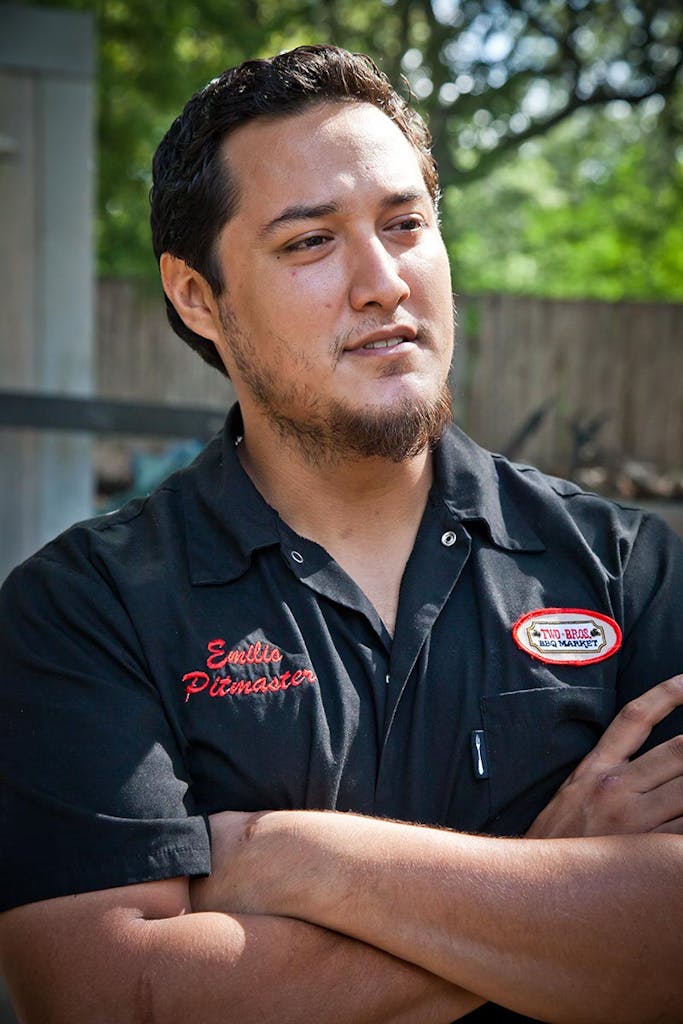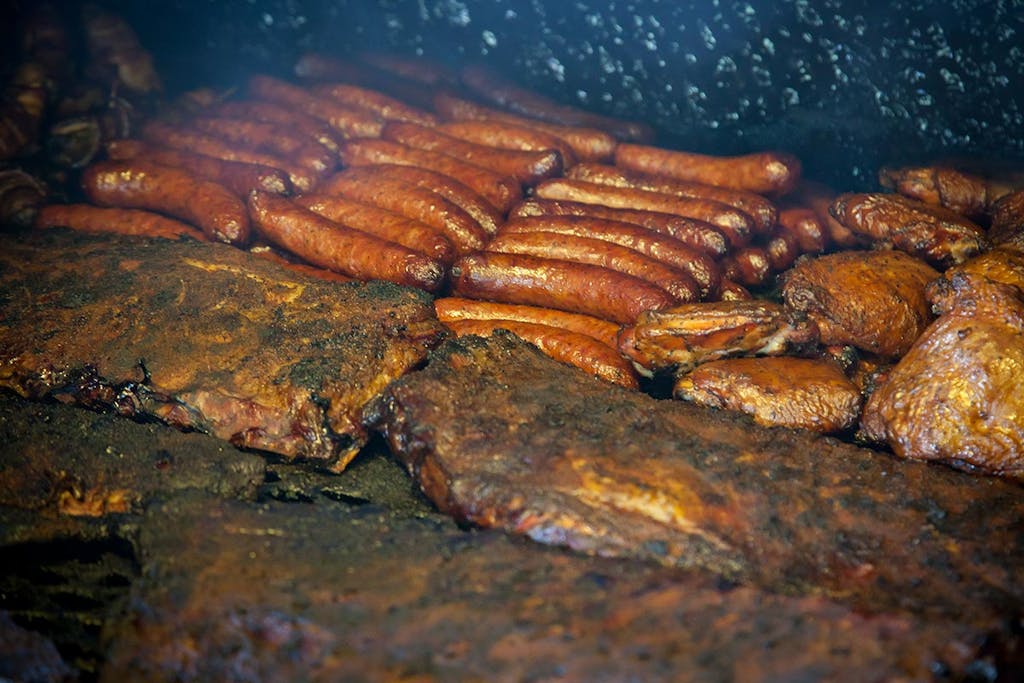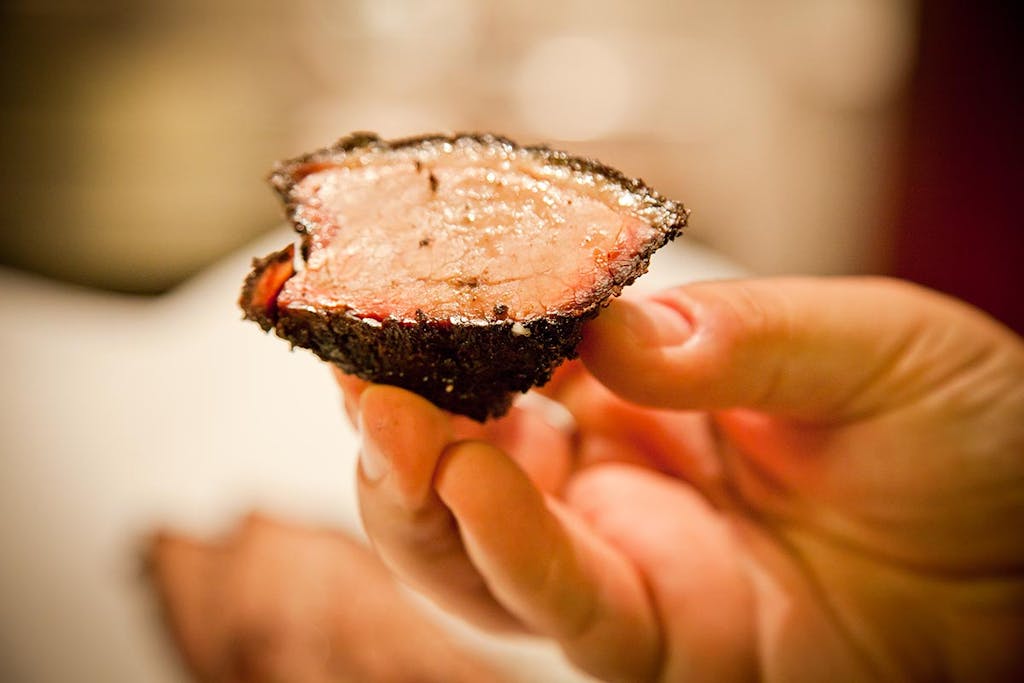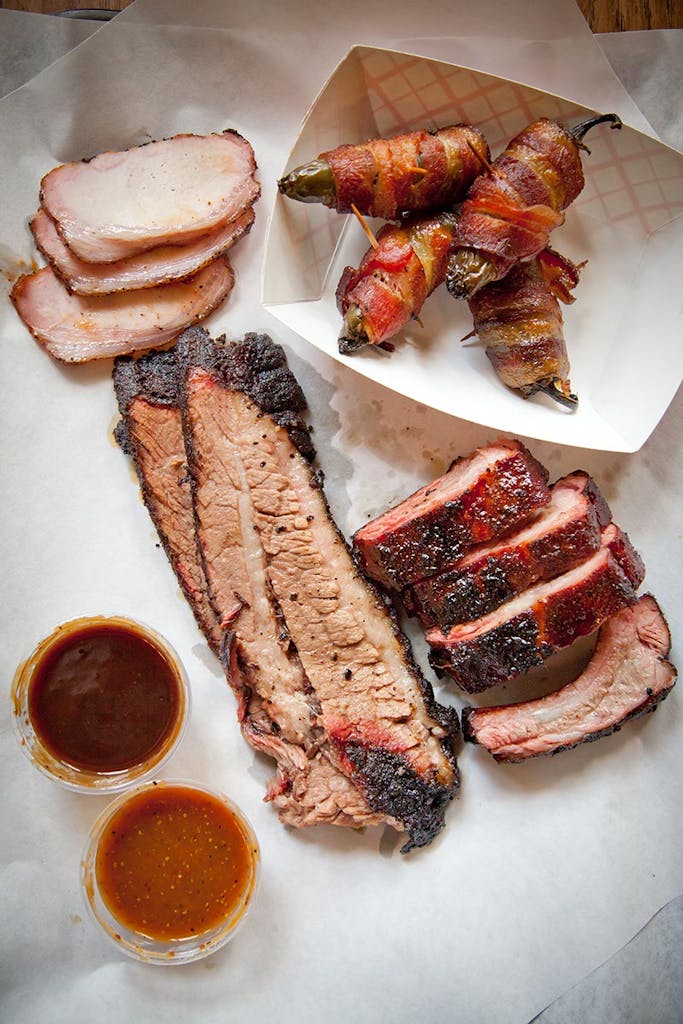
Pitmaster: Two Bros. BBQ Market, opened 2009
Age: 29
Smoker: Wood-fired Offset Steel Smoker
Wood: Oak
The creation of Two Bros. BBQ Market doesn’t follow the usual narrative of a Texas barbecue joint. There was no backyard cook or barbecue competitor that had decided to open up a barbecue joint. Jason Dady was a San Antonio chef and restaurateur more familiar with serving up tasting menus and Italian food than barbecue, but he wanted a true Texas restaurant. When he opened Two Bros. in late 2009 there wasn’t a seasoned barbecue master to run things in the pit room. Instead the self-taught Emilio Soliz made his way up the ranks in Dady’s kitchens before taking the reins at the pits of Two Bros. Now Soliz, who once considered himself an aspiring chef, now fully embraces the pitmaster title.
Daniel Vaughn: My understanding is that you didn’t start your food career in barbecue.
Emilio Soliz: No. Not at all. I was doing bar food. What’s funny is Tim Rattray at the Granary was my sous chef at the Sandbar.
DV: Who was working for whom there?
ES: I worked for him. I was a just a cook. I was only there for four or five months.
DV: What kind of food were you cooking there?
ES: A lot of seafood. It was kinda upscale.
DV: No smoked shrimp or anything?
ES: No. Not at all.
DV: Did you just work your way through kitchens, or did you go to culinary school?
ES: I worked at all the chain restaurants. I was a dishwasher first. My first job as a cook was at Johnny Carino’s. Then I worked at Texas Land & Cattle. I did my rounds before I decided to get serious about my career. I went to work for Stefan Bowers at 20Nine. He’s the chef at Feast in downtown now.
DV: What did you do there?
ES: I started out as a dishwasher then moved up to garde manger. I would come in a couple hours before my shift and chef and I would talk. I would read a lot about recipes and techniques. After that I went to work at the Lodge which is where I met Jason [Dady]. I was only there for two months when he opened up Two Bros.
DV: Did you move over to Two Bros. when it opened?
ES: I worked some shifts there, but it was like a part time job. I was still working at the Lodge too.
DV: How did that work out going back and forth between the two restaurants?
ES: It was fine, but I started realizing I liked barbecue a lot more than French food.
DV: How long did it take for you to stay at Two Bros. for good?
ES: It probably took a year before I moved over and decided to make it my spot. At that point I just didn’t know how long I would be there. I started as just a prep cook. Then I got a raise so I thought I’d stay a little longer. Then Jason asked if I wanted to work the pits. I decided I better really learn how to do barbecue at that point.
DV: How much did you know about barbecue by then?
ES: I had learned under our old pitmaster, but he didn’t really know a ton about barbecue. I had to pretty much teach myself from scratch.
DV: So, you’ve never had a barbecue mentor in your career to teach you the ways?
ES: No. I just got there in the mornings to try something to see if people liked it. If it worked I’d try and fix another part of it the next day. I was always changing up my technique to try and get it to a point that people enjoyed. It took a good year before I started getting good reviews on my barbecue.
DV: That means it took about two years after you started working at Two Bros. before you really got the hang of barbecue?
ES: Yeah, I guess so. Now I feel like I know those pits like the back of my hand.
DV: Do you have any lessons from French cooking that you apply in your barbecue?
ES: Yes. As far as respect for food and appreciating the seriousness of cooking animals.
DV: Does Jason let you develop any other menu item, or is the pit your sole domain?
ES: I get to have input on all of it if I want to.
DV: You said you’ve got a good handle on the brisket. Do you have any one cut that you feel is your specialty these days?
ES: I guess a specialty would mean that it’s something I can just put down in the pit and not worry about it because I know it’ll be perfect. I don’t know. I always get nervous when I put a piece of meat down on the pit. I’m comfortable cooking it all, but I’m always worried about it once I start it.

DV: Is the healthy nervousness something you see as a good characteristic for a pitmaster?
ES: I think so. The more you care, the more you worry. I think about them all as my children. I’m always thinking about how each one of them is doing. I’m always moving them from one part of the pit to another. I never stop thinking about them.
DV: Then you have to give your children away to hungry customers.
ES: Yeah. [laughing] Then you’ve got to give them away.
DV: You have a handle on the cooking process, but what about when it comes to guessing how much meat to put on the pit every day?
ES: It’s a hard one. If you don’t sell it, you lose it and profits go down. I can’t cook too much because we don’t reheat stuff and serve it the next day. I don’t get to just cook one batch and sell out for the day either. I have to cook in batches and keep things fresh.
DV: It sounds like a big gamble every day.
ES: Yeah. You never know. Monday’s a slow day usually. I put on thirty briskets and I might have four left at the end of the night. Some Mondays I go through them too quickly and we could have sold forty briskets. People get mad because we’re out at dinner time, but what can I do? It’s a pain in the ass because you’re almost never right. You either cook too much or not enough.
DV: It sounds like somebody will always be unhappy whether it’s you or the customer.
ES: I think of it as a good thing if we sell out, but it gets us in trouble. People get mad because we run out of food.
DV: As far as the meats go you have a pretty good variety, so does it help that you’ve got plenty of other options if something sells out?
ES: Not really. The people that do understand barbecue don’t make it a big deal, but other people get really worked up. Some people get pissed and say “if you’re sold out of brisket then your brisket must not be very good.” That doesn’t make any sense to me.
DV: Let’s talk about your background. Where are you from?
ES: I’m from Atascosa County [southwest of San Antonio] on the poor side of the country. It’s not even a town, but the little part of the country that I grew up in is between Lytle and Lacoste.
DV: Did you learn anything about barbecue out in the country?
ES: I grew up so poor…I mean we were dirt poor. I would go a day or even two days without a good meal. To me food was really special because it wasn’t something you had every day. It was like a treat. I finally started getting old enough to work and take care of myself that I could afford food every day. That’s when I started discovering new foods and new flavors. I learned how really awesome food is. I fell in love with the concept of feeding people. Because I didn’t really have food, when I feed you that’s like my way of showing you that I like you.
DV: Obviously when you got any substantial food as a kid it was a big deal, so do you have any special childhood memories about food?
ES: Not really. We lived with my mom and she would make random things with poor cuts of food. My brother and I were on our own for a while. There would be two days that went by that we didn’t have food. We’d find a way to get a loaf of bread. Even now whenever I travel I eat bread everywhere. I can eat bread all day and that’s where that came from. We’d eat a whole loaf of bread together for dinner.
DV: You must be in heaven at a barbecue joint with all that free white bread around.
ES: Exactly man. You’ll see me sneaking a slice of white bread. I love that stuff. You know when you see someone throw out the end pieces of a loaf of bread? They say, “I need a real slice of bread.” That pisses me off. They’ve obviously never been hungry. That end slice can fill you up for a couple hours.
DV: How old were you when you started working in food?
ES: When I was sixteen I made fried chicken at Sea World. After that I worked at Sonic. I’ve always been in the kitchen.
DV: And now you’re in the position of cooking at one of the fifty best barbecue joints in Texas.
ES: For the next list, I want to be the pitmaster at the #1 barbecue joint in Texas.

DV: That’s your goal over the next few years?
ES: My goal last year was to make the list. In a couple years I want to be at the top.
DV: Have you seen an increase in business since you made the list?
ES: Oh yeah. It has slowed down a bit now with the school year starting up, but it was huge. I could not cook enough food. I was doing fifty briskets every day and still selling out. It was pretty intense.
DV: How did you hear that you made the list?
ES: Twitter. It was my day off. I was out at the river and I was supposed to be relaxing, but I was staring at my phone.
DV: It had to feel pretty good to reach that goal in a relatively short time with Two Bros. being less than four years old.
ES: It was a good year for us. We made it in Texas Monthly, then we were on the cover of your book. It was pretty cool.
DV: Did Jason give you a raise?
ES: Yeah. A little bit.
DV: As you pointed out, your food was on the cover of my book about Texas barbecue. Did you know where that food came from the first time you saw the cover?
ES: I recognized it immediately. Jason sent me a photo of it and I knew it right away.

DV: I guess you ought to recognize your own children even if they are on butcher paper.
ES: Seriously, I was like “Holy s—! Those are my babies.” I know it’s really weird, but I do feel so connected to my food.
DV: With the extra business have you gotten some extra help? Do you have some pit trainees?
ES: I’ve got a couple of guys here. We call them henchmen.
DV: What is the timeline of your normal work day?
ES: We’ll usually get there around 7:00 and stoke the fire. Overnight we’ll leave briskets, spares ribs and pork butts. We’ll take the ribs off, rotate briskets and wrap the butts. Then we’ll throw down the baby backs, chicken, sausage, turkey and the pork loin. It’s all ready by 10:30. Then we’ll put more on for the afternoon.
DV: What are your hours?
ES: We open at 10:30 and close at 8:30.
DV: That’s ten hours of time that you need to have all of your meats ready and fresh. That’s a long time.
ES: Yes.
DV: What do you do to hold the meats?
ES: For the briskets we keep them in the pit. The rest of the meats go into a warmer by the cutting station.
DV: Do you still eat barbecue?
ES: No. I haven’t gotten invited to a barbecue in a while. I’ll eat a smoked sausage on a slice of bread, but not really much brisket.
DV: I guess that means you don’t travel around the state eating other people’s barbecue.
ES: Apparently that’s what I’m supposed to do, but I’d rather eat something else.
DV: What is it you’d rather be eating?
ES: I love Chinese food.
DV: Does your wife get sick of barbecue too?
ES: She still loves barbecue, she just hates the smell of it.
DV: Is it your clothes that she hates smelling?
ES: Yeah. We have separate closets. She makes me get undressed outside the bedroom and leave the clothes in the washroom.
DV: They still smell like smoke in the closet after they’re washed?
ES: Oh yes. You don’t get rid of that smell. I showered today and I still smell like wet oak.
DV: Do you feel like you’re slowly being preserved in oak smoke?
ES: Yes. My skin smells like oak smoke. My hands always smell like smoke and beef.







